INDEX
- English
- 日本語
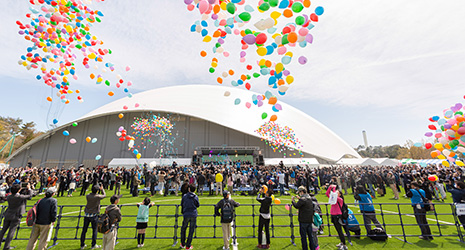
Scene from the J-Village re-opening ceremony - English
- 日本語
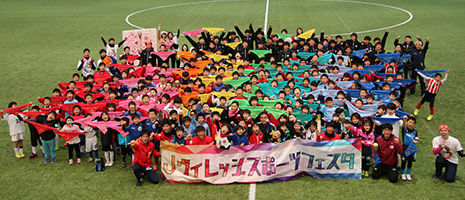
Children gather for a sports event
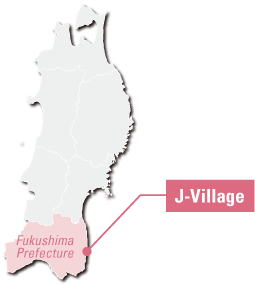
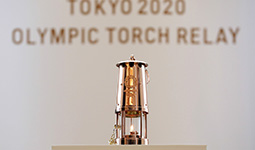
The Olympic flame on display at J-Village, April 2020 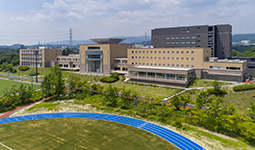
The J-Village Sports & Community Hotel 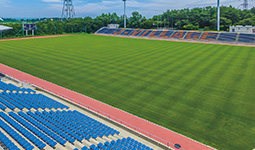
The J-Village stadium and natural turf pitch
May 2020
J-Village: A Symbol of Restoration

Following the Great East Japan Earthquake in March 2011, J-Village in Fukushima Prefecture, formerly the national training center for football, was used exclusively as an operational base to deal with the disaster at the Fukushima Daiichi Nuclear Power Station. However, in July 2018, J-Village was reborn and restarted as a symbol of restoration, and is currently regaining the appearance it had before the disaster, with about 490,000 visitors in 2019.

J-Village in Naraha Town, which faces the Pacific Ocean in eastern Fukushima, was unveiled in 1997 as Japan’s first national training center for football. The Argentina National Team used the facility as their training camp at the time of the 2002 FIFA World Cup, which was jointly hosted by Japan and Korea.
When the Great East Japan Earthquake struck the area on March 11, 2011, it was used as an operational base to cope with the disaster at the Fukushima Daiichi Nuclear Power Station, which was managed by Tokyo Electric Power Company. Takana Yusuke of J-VILLAGE Inc. explains:
“Immediately after the disaster occurred, J-Village was converted into a hub to enable the relevant people to congregate, including the members of the Self-Defense Forces, fire departments and Tokyo Electric Power Company who were involved in the disaster response operations. They prepared everything here before traveling to the accident site by bus.”

Workers’ dormitories were constructed on the premises, and the turf fields were graveled to create parking spaces. J-Village had no choice but to suspend its business after the earthquake.
However, the appointment of Tokyo as the host city of the 2020 Summer Olympics and Paralympics prompted the venue’s reopening. In January 2015, Fukushima Prefecture drew up the J-Village Restoration and Redevelopment Plan with a view to resuming the operation of J-Village as a symbol of restoration before the 2020 Summer Olympics and Paralympics. They initiated the process for reopening with a new mission covering five core areas: (1) Show people in Japan and overseas how Fukushima Prefecture has risen to the challenge of restoration; (2) Lead the restoration and regeneration of the area; (3) Contribute to the promotion of sports; (4) Nurture top athletes; and (5) Contribute to the health promotion of the local residents.
After restoration work carried out over seven years and four months, J-Village resumed operation on July 28, 2018 after an extended closure. Approximately 1,000 people attended the commemorative ceremony to celebrate the resurrection of J-Village, including Hisako, Princess Takamado, Honorary Patron of the Japan Football Association; the Governor of Fukushima Prefecture, members of the football community and residents of Fukushima Prefecture.

One stadium with spectator stands, seven natural turf pitches, two artificial turf pitches, and a roofed all-weather practice field have been rebuilt as the new J-Village, which occupies approximately 49 hectares in total. The practice field of approximately 10,000 square meters is the largest indoor practice field in Japan, and it is suitable for multiple sports including football and rugby. A seven-story hotel with a convention hall that can accommodate up to 300 people was also constructed to meet the demand from businesses, including the Fukushima Innovation Coast Scheme drawn up by the government and Fukushima Prefecture to create robot and energy-related new industries and employment opportunities, as well as conferences held to bring decommissioning experts together.
In 2019, J-Village attracted approximately 490,000 visitors. Among them was the Argentina National Team, which used the venue as a training camp during the Rugby World Cup held in Japan from September to November 2019. It was also decided that the Olympic torch relay inside Japan would start in J-Village, ahead of the 2020 Tokyo Olympics. However, this plan was revised due to the postponement of the games, and a public exhibition of the Olympic flame was held in J-Village in early April, with appropriate COVID-19 infection control measures in place, shining a light on the future.

“We hope to welcome people from around the world here by cooperating with the local residents, and show them how Fukushima has risen to the challenge of restoration,” Takana says.
J-Village has made a new start as a place where the joy of sports can be shared with people around the world.

(This is a revised version of the article that appeared in the October 2019 issue of Highlighting Japan.)

